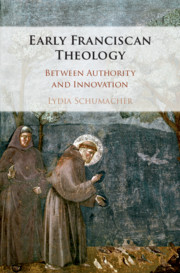Book contents
- Early Franciscan Theology
- Early Franciscan Theology
- Copyright page
- Dedication
- Contents
- Acknowledgements
- Abbreviations
- Chapter 1 Early Franciscan Theology: An Introduction
- Chapter 2 The Franciscan Context
- Chapter 3 The Philosophical Context
- Chapter 4 Theological Vision
- Chapter 5 Theistic Proof
- Chapter 6 The Divine Nature
- Chapter 7 The Trinity: Context
- Chapter 8 The Trinity: Doctrine
- Chapter 9 Christology
- Chapter 10 Incarnation
- Chapter 11 Moral Theology
- Chapter 12 Conclusion: The Promise of Early Franciscan Theology
- Bibliography
- Index
Chapter 5 - Theistic Proof
Published online by Cambridge University Press: 14 June 2019
- Early Franciscan Theology
- Early Franciscan Theology
- Copyright page
- Dedication
- Contents
- Acknowledgements
- Abbreviations
- Chapter 1 Early Franciscan Theology: An Introduction
- Chapter 2 The Franciscan Context
- Chapter 3 The Philosophical Context
- Chapter 4 Theological Vision
- Chapter 5 Theistic Proof
- Chapter 6 The Divine Nature
- Chapter 7 The Trinity: Context
- Chapter 8 The Trinity: Doctrine
- Chapter 9 Christology
- Chapter 10 Incarnation
- Chapter 11 Moral Theology
- Chapter 12 Conclusion: The Promise of Early Franciscan Theology
- Bibliography
- Index
Summary
Since the late medieval period, Anselm of Canterbury has been heralded in the West as the first proponent of the so-called ontological argument for God’s existence. This kind of argument purports to provide proof for the reality of God, which is derived from the very definition of God as the supreme being. As such a being, ontological arguments presume, God must possess all perfections – including the perfection of existence. Thus, one need only think about what he is to know that he exists. In that sense, ontological arguments are purely rational: they have no other source than human reason. Over the centuries, philosophers have formulated many different versions of this basic argument; however, most of them are framed with reference to a broader tradition of thought that supposedly began with Anselm.1
- Type
- Chapter
- Information
- Early Franciscan TheologyBetween Authority and Innovation, pp. 103 - 118Publisher: Cambridge University PressPrint publication year: 2019



